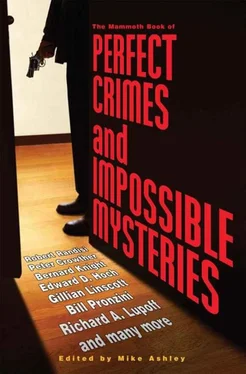Two days later, on the night of the Conservative Club’s Christmas Party, Hilda had bolted her meal and – though she knew she was risking things – had gone to the toilet at ten minutes to ten (Arthur Clark’s toilet habits being legendary). Once out of the ballroom, she had run down to the Gentlemen’s toilet, removed the tissue rolls from all but one WC, and had treated the first few sheets of the remaining roll with the special bottle in her handbag. It was four minutes to ten when she had finished.
She had arrived back in the ballroom at 9:58 just in time to see Arthur get up from the table and set off for his date with his maker. She had not been able to go straight back and was grateful for Agnes Olroyd catching her to talk about the break-in and about her Eric’s prostate. By the time they had finished talking, Hilda’s composure was fully restored and she was able to rejoin the table.
And now Harriet was nowhere to be seen. But that could wait.
The main thing as far as Hilda was concerned was to find her bag.
And she had a good idea as to where it was.
Harriet’s revelations had hit Edna Clark harder even than her husband’s death less than twelve hours earlier.
In Edna’s kitchen, with the sun washing through the window that looked out onto the back garden and with steam gently wafting from the freshly boiled kettle, Edna sat at the table feeling she had suddenly lost far more than her life partner: now she had lost her life itself. Everything she had believed in had been quickly and surely trounced by the blubbering Harriet Merkinson when she burst through the front door, ran along the hall-pursued by a confused Betty Thorndike – and emerged in the kitchen, tears streaming down her face. And now Edna’s 27 years with Arthur lay before her in tatters; every conversation, every endearment whispered to her in the private darkness of the their bedroom, every meal she had prepared and every holiday snapshot they had taken.
While Harriet continued sniffling and Betty simply stood leaning against the kitchen cabinets (installed by Arthur, Edna recalled, one laughter-filled weekend in the early 1980s), her eyes seemingly permanently raised in a mask of disbelief, Edna looked around at the once-familiar ephemera and bric-a-brac of a life that now seemed completely alien. These were things from another life – another person’s life – and nothing to do with Edna Clark, newly bereaved widow of one Arthur Clark, late of this parish.
The story had been a familiar one. Even as Harriet Merkinson had been burbling it out – the clandestine meetings, the whispered affections, the promise of a new life once Arthur had built up the nerve to leave his wife-Edna felt that she had heard it all before… or read it in a book someplace, maybe even watched it on television. The Arthur revealed by Harriet was not the Arthur she remembered, save for one thing: his toilet habits. At least something was constant in her husband’s two lives.
And now, while Edna’s mind raced and backtracked and questioned and attempted – in the strange and endearing way of minds – to rationalize and make palatable the revelations, the “other” woman continued to burble a litany of regret and sorrow and pleas for absolution and forgiveness.
“I can’t forgive you,” Edna said at last, her words cutting through the thick atmosphere like a knife through cheese. “Never,” she added with grim finality. “I can understand, because I know these things do happen, but I can never forgive you. You haven’t taken only my husband’s memory, you’ve completely removed my entire life.”
It was the most articulate statement Edna had ever made, and the most articulate she would ever make in what remained of her life. Of course, she would come to terms with what had happened, but she would never get over it.
“Edna, Edna, Edna, Ed-”
“Now get out,” Edna said, cutting Harriet’s ramble off midword. Her voice was quieter now, more composed, gentle even. There was no animosity, no aggression, no threats of retribution: just a tiredness and, the still silent Betty was amazed to see, a newfound strength that was almost majesterial. “I never want to speak with you again.”
Minutes later, Betty and Edna heard the distant click of the front door latch closing. It sounded for all the world like the closing of a tomb door or the first scattering of soil on a recently lowered coffin. Edna leaned forward and placed her face in her hands, and she began to sob, quietly and uncontrollably.
While Malcolm Broadhurst was greeting the two uniformed policemen on the steps of the Regal’s ornate front door, two things were happening, both of them personally involving the Merkinson twins.
For Harriet, the routine so cherished by her sister had been a chore. More than that, it had been the bane of her life.
Harriet had long wanted to get out of the repetitive drudgery of the existence she shared with Hilda, and Arthur Clark-dear, sweet Arthur, with his strange toilet habits – had been her ticket to salvation. Love was a new experience to Harriet: for that matter, she did not know – not truly, down in those regions of the heart and the soul where such things reside – whether she really loved Arthur, for she had never experienced such feelings, even as a teenager and a young woman. But she did see in him the means whereby she could attain a new life, a life of relative importance. “Harriet and Arthur”, “Arthur and Harriet” – she couldn’t decide which she preferred, but she preferred either to “The Merkinson twins” or “Hilda and Harriet”.
As she fished out the old clothesline from the kitchen cupboard, taking care to replace the various bottles and cartons of disinfectant and packets of soap powder, she felt a calmness come over her. Arthur’s death had effectively removed her last chance for salvation, and she had been destitute. But now, thanks to the clothesline, she saw a solution. It wasn’t the one she would have preferred but it was now the only one available. The only game in town. She could neither face life with Hilda nor life without the constant frisson of excitement she got prior to meeting Arthur, and she certainly could not face the comments and whispers around town when she walked down the high street or around the green. No, this way was best for all concerned. It was best for Edna – who might at least derive a little satisfaction when she heard – and it was best for Hilda, who would have to put up with her own share of her sister’s shame.
She climbed the stairs wearily and attached one end of the clothesline to the upstairs banister rail. Then, after ensuring that the line’s drop was sufficiently short to do the job, she fashioned a noose of sorts and slipped it over her head. With one final look around the landing she climbed over the rail and sat on the banister, staring down at the floor far below. As she jumped, in that fleeting but seemingly endless second or two before the line pulled taut without her feet ever touching the hall floor, she wondered where Hilda was… and what she would say when she came home.
“You’ve got something for forensics?”
Broadhurst nodded. “It’s inside. I didn’t want to be seen with it outside.”
They started to walk.
“I came up last Wednesday,” Malcolm Broadhurst explained to the two uniforms. “To check into the break-in down at the animal testing centre.”
“Oh, yeah?” one of the policemen observed. His name was James Proctor and he had perfected that same aggressive and questioning response to even the most innocent facts or snippets of information, seeming to require confirmation or substantiation to anything said to him.
“Yeah,” Broadhurst confirmed. They were now walking up the Regal’s steps and approaching the wide, oak-panelled revolving door. “Your Inspector Mishkin asked me up because there were a few things he wasn’t too happy about. I take it you two aren’t working on that case?”
Читать дальше











